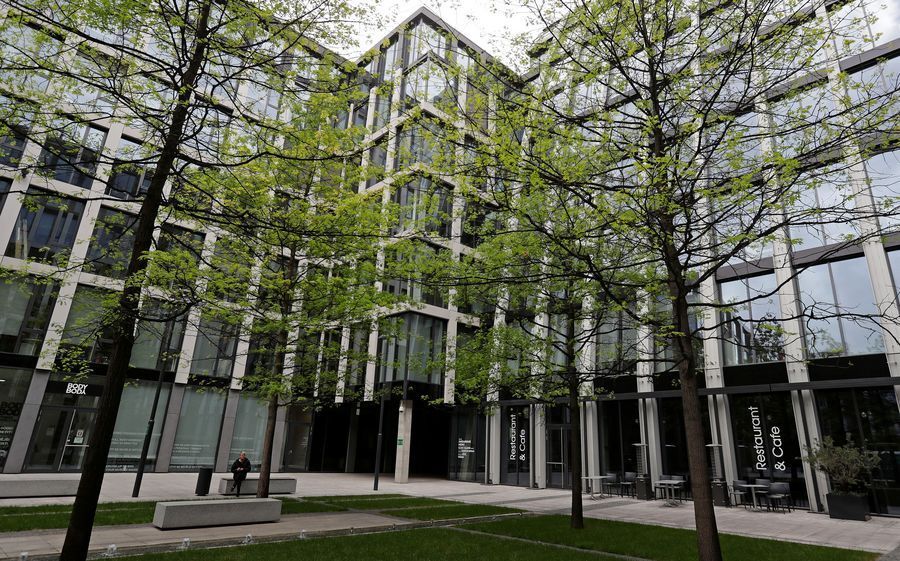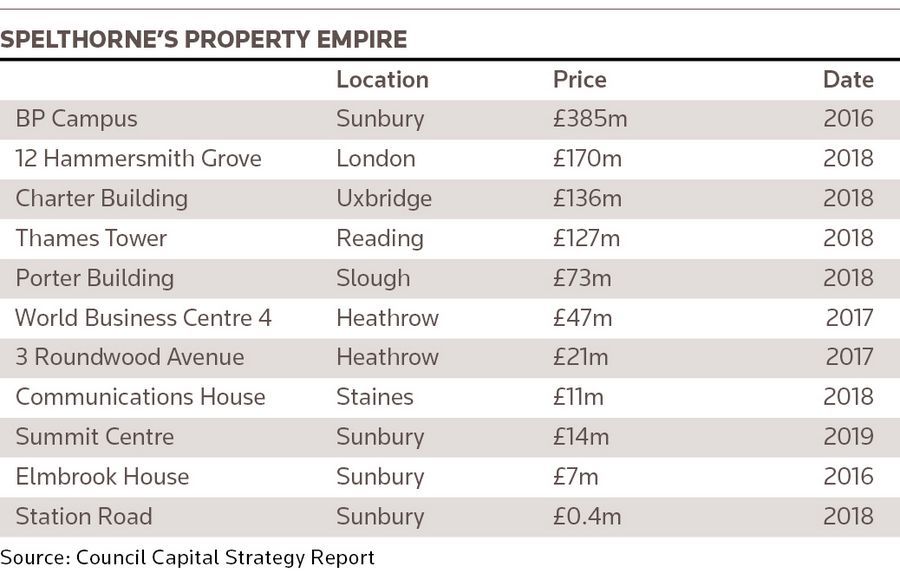
Spelthorne Borough Council will need to dip into its reserves to balance its budget this year, after its £1bn punt on the commercial property market was badly shaken by the pandemic, leaving some of its biggest tenants unable to pay their rent.
The borough has already withdrawn £1.8m from its sinking fund after some tenants including shared workspace operator WeWork negotiated waivers on their rent. It plans to withdraw an additional £5.5m to make up for this year’s shortfall. The amount will be deducted from reserves over the next four years, but booked as income this year.
While Spelthorne says that it has only written off 0.02% of the commercial rent due in the current fiscal year that ends this coming week, that figure doesn’t tell the whole story. That’s because the council has granted extensions to several of its struggling tenants that aren’t counted as missed payments.
It has collected just £42.6m from its commercial tenants this year, against the £50.2m that had been forecast.
Given that local authorities are legally required to balance their budgets, the council was left with little option but to tap reserves in order to avoid deep cuts to local services.
Terry Collier, chief financial officer at the council, confirmed that the council had agreed rent waivers and deferrals with a number of clients. IFR reported last June that it had granted an 18-month rent waiver to WeWork in exchange for a five-year extension on its rental agreement.
“We're doing very well at the moment in terms of our collection performance,” he said. “Where we have agreed lease extensions, that potentially helps the council in the long term. There have also been a few short-term deferral agreements.”
“We're doing better than the sector as a whole, and certainly the benchmarks we've seen in terms of commercial assets. Some of that is down to hard work, engaging with tenants. But the location of our assets – the fact that they're not actually in central London – also helps.”
Building an empire
Spelthorne’s commercial property empire dates back to 2016, when BP – a major employer in the borough – decided to sell and lease back its offices. The council swooped in, borrowing £385m to buy the campus with a view to using any profits from the rent to boost the council’s budget.
Since then, it has bought up another 10 office buildings, all of it funded through borrowing from the Public Works Loan Board, which lends to local authorities with few strings attached. The council, one of the smallest in the country, is now one of the most indebted with more than £1bn of debt.
Over the past few years, the plan worked: after paying off interest on the debt, putting aside cash to pay off the principal and contributing to a sinking fund, the portfolio still generated around £10m of excess returns that Spelthorne used to fund social care, housing and waste collection.
Last year, the profits from its property portfolio provided about half of the council’s total budget. That allowed Spelthorne to avoid many of the deep cuts seen at councils elsewhere – but has also left its frontline services exposed to possible fluctuations in the commercial property market.
Collier said that the council is well placed to weather the pandemic, having built up a £25m sinking fund for such eventualities. But the sinking fund is also supposed to cover maintenance, unexpected works and the sudden loss of clients, so dipping into reserves now isn’t without its risks.
“We have earmarked reserves, money put aside for precisely these eventualities – for covering voids, rent free periods, and also capital refurbishments that may come up from time to time," he said. "That is what they are for.”
He also said that the sinking fund would continue to increase over the next four years even as £5.5m is withdrawn to pay for lost income during the pandemic. The council expects the sinking fund to rise to around £46m by March 2025 from just under £25m today.
Concerns
Former council leader Ian Harvey, seen as the man behind the property bets, left that role last year amid infighting within the ruling Conservative Party.
KPMG, former auditor to the council, refused to sign off on the 2018 accounts because of “material concerns” around Spelthorne’s interpretation of the law, specifically around its powers to borrow and invest. KPMG was replaced with another accountancy firm last year. And an internal council enquiry uncovered what it said were council failings in transparency, reporting and accountability.
There are also concerns within the council about potential lasting damage from the pandemic. The council is expected to write down the value of its portfolio by around 5% over coming weeks. That has no impact on its budget but reflects a general decline in expectations around rental income.
Collier said the council had commissioned a study into what the pandemic might mean for its commercial property portfolio. He said that it had actually gained some new tenants over the period, although some have been granted rent-free periods.
Even with the new tenants, one of its biggest office buildings is only around half full. Spelthorne bought The Charter Building in Uxbridge for £136m in 2018. Prime Minister Boris Johnson praised the purchase during a visit last year, but the council is struggling to fill the building.
“The only site where we've got voids remains the Charter Building, all the others are fully let," said Collier. "We have attracted new tenants despite the pandemic and at the end of this month 58% of the space at Charter will be let – and we are getting more enquiries.”
Biggest tenant
A bigger question is what happens to its biggest tenant, BP, which contributes about a third of expected rental income. The oil giant is currently in the process of cutting thousands of jobs and has said thousands more will move to remote working.
BP currently has a 15-year lease agreement on the site and would need to negotiate any break with Spelthorne if it decided that it no longer needed the entire site.
“We have always had a very close relationship with BP," said Collier. "They are so important to our local economy and have been on the site for more than 100 years. They have told us that they don't have any intention to move away.”
